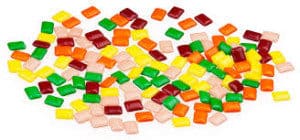Gum is a popular favorite for those who want to whiten their teeth and freshen their breath. But is chewing gum bad for you? We’ll highlight some key chewing gum facts and the healthiest chewing gum options available for keeping your pearly whites sparkling clean.
Facts About Chewing Gum
When it was first invented, chewing gum was made from a rubber extract called “chicle” that comes from the Latin American sapodilla tree. Today, chewing gum is made of synthetic rubbers that mimic the chewy texture of chicle. These rubbers are flavored with either sugar, xylitol (a natural sweetener) or aspartame, as well as other natural and artificial flavors.
Is Gum Bad for You?
There’s no doubt that chewing gum is delicious. Unfortunately, there are some drawbacks that come with certain types of gum. Chewing gum can be bad for you under some circumstances, such as:
Chewing sugary gum.
Excessive sugar can cause cavities, and there’s no doubt that sugar-filled gum can facilitate tooth decay. Many types of bubble gum, fruit-flavored gum and even some types of mint flavored gum are chock full of sugar, so be sure to read labels and avoid sugary gum whenever possible to keep your teeth in good shape. Fortunately, there are plenty of sugar-free options out there today that taste amazing while helping keep cavities at bay.
You have braces.
Orthodontists have a particular distaste for gum, and for good reason. Chewing gum when you have braces is a surefire way to have problems down the road. Chewing gum can cause damage to your braces by loosening brackets and bending wires, which can cost you time and money and lengthen the treatment process. Gum can also get stuck in wires, which can lead to sugar build up and eventually cause cavities.
You frequently clench or grind your teeth.
Bruxism is a condition in which a patient frequently grinds or clenches the teeth. This motion can eventually result in headaches and even damage the enamel.
Chewing gum can exacerbate bruxism and potentially lead to TMJ, or jaw dysfunction that’s accompanied by pain and limited motion. If you have bruxism, it’s wise to avoid chewing gum so as not to aggravate your condition.
Chewing Gum Benefits
Although there are some downsides to chewing gum, it can provide many benefits under the right circumstances.
According to the American Dental Association, chewing in itself increases saliva flow, which in turn helps wash away the acid that can cause tooth decay. Studies have also shown that chewing sugar-free gum after meals can help fight cavities, and it’s been said that chewing gum can even help improve concentration and memory.
Is Gum Bad for You? The Verdict
Gum can be bad for you if it’s loaded with sugar, if you have braces, or a condition like TMJ or bruxism. Otherwise, chewing sugarless gum in moderation is pretty harmless.
If you can’t imagine your life without chewing gum, be sure to look for gum that isn’t loaded with sugar — or better yet, a sugarless gum that’s sweetened with xylitol (a natural sweetener). Look for the ADA seal of approval that indicates a dentist recommended gum, like 5 Sugarfree Gum or Dentyne Ice Sugarless Gum.
If you like to chew gum for the sole purpose of freshening your breath, try using mouthwash, sugar-free mints or simply brushing your teeth. All of these are great options for those who have chewing sensitivities or braces.
Dr. David Evans is a dentist based in North Boulder, Colorado. He has been practicing for more than 16 years and specializes in both general and cosmetic dentistry. To get in touch, visit davidevansdds.com.

